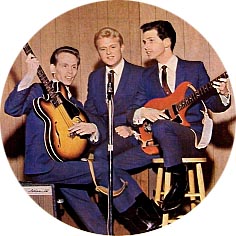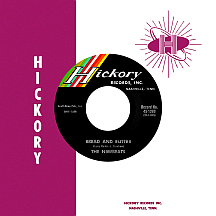THE NEWBEATS
Bread and Butter
A solo act turned into a sibling duo, later added an unrelated lead singer and had a walloping good time as a trio until the inevitable occurred and only recorded works and memories remained. Long before The Newbeats stood side-by-side with pop music's upper crust, Louis Aldine Mathis, age 17 in 1954, a piano and guitar player from Hahira in southern Georgia who'd grown up in Bremen, a short hop west of Atlanta, made his way several hundred miles further west to Shreveport, Louisiana immediately after finishing high school. He participated in KWKH radio's Louisiana Hayride, a weekly musicfest broadcast throughout several states. He was in New Orleans when his guitar-toting younger brother Marcus Mathis joined him two years later; the pair performed as a duo and eventually landed regular studio work. A stint in rocker Dale Hawkins' band led to a short-term contract with Chess Records, the Chicago-based company that had released "Susie-Q" and many of Dale's other innovative recordings.
Their first single, "Deep Sleep," appeared in late 1958 on the Chess-owned Argo label; a ballad with a very Everly-like sound, it was credited to The Brothers, a mild attempt at passing for the much more famous Kentucky-born brother act. "Sioux City Sue," a second single under the Brothers name, had originally been a country hit for Dick Thomas in 1945; their rocking teener approach to the song also failed to connect. "Tell Him No," released on the Bullseye label using their own names, Dean and Marc, did very well, nearly hitting the top 40 despite being a near-soundalike vocal cover of Travis and Bob's original version, a top ten hit at about the same time. One more Bullseye single by Dean and Marc materialized ("Cry") before they found themselves back in the bars singing for tips. They continued putting out 45s for various small labels under their own names (Marc at some point changed the spelling to Mark), including a solo disc by Dean in 1962, "Got a Lot of Love."
Larry Henley hailed from Arp, a tiny town on the outskirts of Tyler, Texas, about a hundred miles west of Shreveport. Slightly older than the Mathis brothers, it took him several years to land his first recording contract with Roy Acuff's Nashville-based Hickory Records. Debut single "It's Happening Again" was written by Everly regulars Boudleaux and Felice Bryant. Larry, Dean and Marc met in Shreveport and formed an act that showcased Henley's falsetto lead; by 1964 they convinced Larry's bosses at Hickory to give them a shot as a trio. With the sound of pop and rock evolving rapidly with so many British artists infiltrating the U.S. airwaves, it was decided they would be called The Newbeats to represent a fresh sound in the music business (apparently unconcerned that their style was rooted in the rock and roll and doo wop of the 1950s).
"Bread and Butter" was a song written by drummer Larry Parks (who'd played with Roy Orbison's band) and Jay Turnbow (a member of The Ivy Jives, a band that had worked with Crickets producer Norman Petty). The well-worn three-word food-phrase title took on a mildly scandalous subtext when applied to relationships ('...No more bread and butter, no more toast and jam...I found my baby eating with some other man!') and caught on quickly, zooming up the national charts in the summer of 1964, reaching number two in September behind The Animals' "The House of the Rising Sun" before spending another runner-up week under pal Orbison's leap-frogging "Oh Pretty Woman." Henley's high-pitched lead (complete with obligatory staccato 'No, no!' screams) gave the song a novelty appeal, but would this approach work a second time? Turns out it did with "Everything's Alright," a lively John D. Loudermilk offering that hovered in the top 20 between Thanksgiving and Christmas.

Larry's falsetto was the selling point as the guys landed more hits, made frequent television appearances and were tightly booked for live shows while managing a few separate recording projects. Larry did the danceable "Stickin' Up For My Baby" and a Mickey Newbury tune, "Eastham Prison Farm," that could be seen as a worst-scenario answer to "Bread and Butter" with the lyrics 'I'm gonna be here for the rest of my life, I caught a man messin' 'round with my lovin' wife.' Meanwhile, Dean and Marc sidelined with the cheerful, acoustic "Just a Step Away." But the Newbeats discs were their, ahem, bread and butter. "Break Away (From That Boy)," a Mathis sibs composition, was the trio's third straight top 40 single in February 1965. "(The Bees Are for the Birds) The Birds Are for the Bees," another whimsical Parks-Turnbow track (cowritten with friend Bob Finnicum) peaked mid-Hot 100 in May.
The song many fans consider their best was "Run, Baby Run" ('...back into my arms!'), penned by longtime Orbison associate Joe Melson and Nashville producer-songwriter Don Gant; it just missed the top ten in December '65. It was beginning to look like the Newbeats were on board for the long haul, but Doug Kerhaw's "Shake Hands (And Come Out Crying)," while consistent with the previous singles, stalled near the bottom of the charts in early 1966. Three years' worth of Newbeats releases, interspersed with occasional Henley and Mathis singles, failed to register at radio or on the charts, though the group continued touring and delighting audiences with the handful of familiar hits they'd strung together. In 1969 they returned to the lower rungs of the charts with a remake of Loudermilk's "Thou Shalt Not Steal" (Dick and DeeDee had made it their own in '65) and, more notably, "Groovin' (Out on Life)," getting mileage out of a phrase appropriate in the late-decade "peace and love" era, while "Bread and Butter," reissued on the flip side, may have boosted sales a tad.
Henley's songwriting career started to kick in with "The World Needs a Melody," a minor country hit for Nashville-based singer Red Lane in the spring of 1971; he'd cowritten it with Kenny O'Dell (known for his 1967 top 40 hit "Beautiful People"), a frequent collaborator in the years to come. "It's Alright With You" by Rose-Colored Glass and two more Red Lane singles preceded "Why Don't We Go Somewhere and Love" in '72, an early country entry for previous pop star Sandy Posey, and others by The Carter Family, Roger Miller ("Hoppy's Gone) and "'Til I Get it Right," a Lane-Henley number that Tammy Wynette took to number one country in '73 and soul singer Bettye Swann sent to the R&B charts soon after. Then Tanya Tucker took "Lizzie and the Rainman" (an O'Dell-Henley song) to the top of the country survey the following year.
The Newbeats continued milking their brief period of fame, playing to solid but ever-shrinking crowds. They made a few more 45s: there was a rock take on The Temptations' classic "The Way You Do the Things You Do" on Buddah in '73 and Barbara George's "I Know (You Don't Want Me No More)" for Playboy Records in '74. Exhaustion was, perhaps, the main reason Dean, Marc and Larry called it quits midway through the decade. Later, Henley hit the peak of his songwriting career with one of the biggest hits of the 1980s; "Wind Beneath My Wings," which he created with fellow country songwriter Jeff Silbar, was recorded by many singers including, in 1983, Lou Rawls and Gary Morris (who had a top ten country hit with it) as well as Gladys Knight and the Pips (under the title "Hero"). The ultimate victory came when Bette Midler brought moviegoers to tears with her version featured in the hit film Beaches; in June 1989, Bette's rendition reached number one on the Billboard charts. The following February the song won Grammy awards for Record of the Year and, significantly for Silbar and Larry Henley, Song of the Year, giving The Newbeats' former falsetto frontman a coveted trophy for his mantle.


